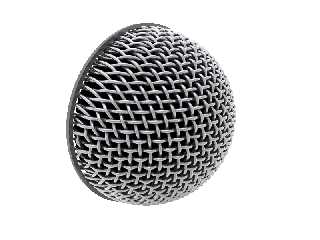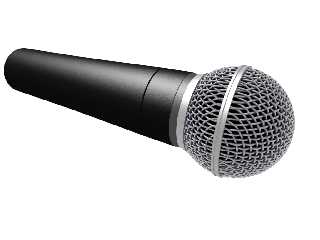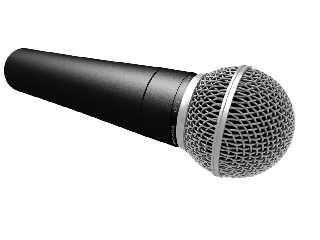 |
 |
|
 |
|
 |
|  |
|  |
|
 |
|
 |
|  |
|  |
|
 |
"Kenneth" <kdw### [at] earthlink net> wrote:
> Yes, now that you mention it, I think you're right. I wonder how they form the
> wire mesh into a ball (or hemisphere, as the case may be, which is probably
> easier) without a visible 'pole' showing? If just a hemisphere, I guess you
> could simply press the pre-made mesh into a bowl-shaped form or mold, and
> accept the slight distortion (?)
As a matter of fact, I don't recall having ever seen a microphone that has more
than a hemisphere - not without some "equator" kind of thing, that is. net> wrote:
> Yes, now that you mention it, I think you're right. I wonder how they form the
> wire mesh into a ball (or hemisphere, as the case may be, which is probably
> easier) without a visible 'pole' showing? If just a hemisphere, I guess you
> could simply press the pre-made mesh into a bowl-shaped form or mold, and
> accept the slight distortion (?)
As a matter of fact, I don't recall having ever seen a microphone that has more
than a hemisphere - not without some "equator" kind of thing, that is.
Post a reply to this message
|
 |
|  |
|  |
|
 |
|
 |
|  |
|  |
|
 |
"m_a_r_c" <jac### [at] wanadoo fr> wrote:
> Note that it does not come with any switch .
> Switching a mike on/off is a too serious case to let it at user good will (a
> sound engineer POV :-)
Yeah. Did a bit sound engineering in a church. Mike on/off switches are of the
devil...
Unfortunately we also had some wireless mikes that came with a mute switch on
the transmitter. Pastoral staff knew well enough to not mess with them (in fact
they insistend in not having to bother about it), but guests familiar with those
toys would occasionally mute them until they were heading for the pulpit... or,
occasionally, until we interrupted them to please turn the thing back on again
so we could give them some amplification ;)
Fortunately, those wireless mikes at least didn't give you that "Pop!" that
tells every sane person that PA systems do *not* like those switches to be
operated without prior warning to the sound engineer (which would in fact make
the switch perfectly redundant)...
> No shiny finish either... a microphone must be sort of stealth.
Hum... then why do they leave the mesh bare metal? fr> wrote:
> Note that it does not come with any switch .
> Switching a mike on/off is a too serious case to let it at user good will (a
> sound engineer POV :-)
Yeah. Did a bit sound engineering in a church. Mike on/off switches are of the
devil...
Unfortunately we also had some wireless mikes that came with a mute switch on
the transmitter. Pastoral staff knew well enough to not mess with them (in fact
they insistend in not having to bother about it), but guests familiar with those
toys would occasionally mute them until they were heading for the pulpit... or,
occasionally, until we interrupted them to please turn the thing back on again
so we could give them some amplification ;)
Fortunately, those wireless mikes at least didn't give you that "Pop!" that
tells every sane person that PA systems do *not* like those switches to be
operated without prior warning to the sound engineer (which would in fact make
the switch perfectly redundant)...
> No shiny finish either... a microphone must be sort of stealth.
Hum... then why do they leave the mesh bare metal?
Post a reply to this message
|
 |
|  |
|  |
|
 |
|
 |
|  |
|  |
|
 |
clipka wrote:
> "Gaf" <nomail@nomail> wrote:
>> A simple isosurface microphone thing with radiosity and focal blur. Render time
>> 86 hour.
>
> Not bad (well, the render time *is* :))
>
> But the real things have a slightly different mesh: Instead of one direction
> converging at the poles, it is centered around a different axis. If you know
> what I mean. So when seen from the top, it looks like a (more or less) perfect
> square grid.
>
> Why not use sphere sweeps? I fancy they'd be faster.
>
>
So, you got me interested.
Here's a test of a sphere_sweep version of a deformed mesh cap.
Render time: 1hr29min. (dual core, 3.7b31) Radiosity on, no focal blur.
cshake
Post a reply to this message
Attachments:
Download 'microphonecap.png' (262 KB)
Preview of image 'microphonecap.png'

|
 |
|  |
|  |
|
 |
|
 |
|  |
|  |
|
 |
CShake <cshake+pov### [at] gmail com> wrote:
> Here's a test of a sphere_sweep version of a deformed mesh cap.
Looking good! Now all you need to do is get some "cushion deformation" into the
mesh (if you know what I mean; looking head-on, the wires should appear to
"bend outward" where they're closer to the mike's central axis), so that they
hit the "equator" at a shallower angle, and then you'll have the real thing.
> Render time: 1hr29min. (dual core, 3.7b31) Radiosity on, no focal blur.
Hum, let's see what focal blur makes of it... com> wrote:
> Here's a test of a sphere_sweep version of a deformed mesh cap.
Looking good! Now all you need to do is get some "cushion deformation" into the
mesh (if you know what I mean; looking head-on, the wires should appear to
"bend outward" where they're closer to the mike's central axis), so that they
hit the "equator" at a shallower angle, and then you'll have the real thing.
> Render time: 1hr29min. (dual core, 3.7b31) Radiosity on, no focal blur.
Hum, let's see what focal blur makes of it...
Post a reply to this message
|
 |
|  |
|  |
|
 |
|
 |
|  |
|  |
|
 |
-----BEGIN PGP SIGNED MESSAGE-----
Hash: SHA1
m_a_r_c wrote:
> 49bb5237$1@news.povray.org...
>> For reference:
>> http://elderly.com/images/new_instruments/MIK/PG58_microphone.jpg
>>
>> Jerome
>
> THE worldwide professionnal reference for voice microphone is Shure SM58
> http://www.polymix-dj.com/catalog/images/SSH-SM58-LCE-B.jpg
> Note that it does not come with any switch .
> Switching a mike on/off is a too serious case to let it at user good will (a
> sound engineer POV :-)
> No shiny finish either... a microphone must be sort of stealth.
>
Being no sound engineer, I'll take your word for it. I only linked
the picture for the view it offers of the steel mesh.
Jerome
- --
mailto:jeb### [at] free fr
http://jeberger.free.fr
Jabber: jeb### [at] jabber fr
http://jeberger.free.fr
Jabber: jeb### [at] jabber fr
-----BEGIN PGP SIGNATURE-----
Version: GnuPG v1.4.9 (GNU/Linux)
iEYEARECAAYFAkm9IgkACgkQd0kWM4JG3k+dUgCfRqN3mlKq3Byt7qGykuqULssf
Sg4AnRo0JF1Dgg3zHdfjR8Wdo9UtKSX/
=NlyR
-----END PGP SIGNATURE----- fr
-----BEGIN PGP SIGNATURE-----
Version: GnuPG v1.4.9 (GNU/Linux)
iEYEARECAAYFAkm9IgkACgkQd0kWM4JG3k+dUgCfRqN3mlKq3Byt7qGykuqULssf
Sg4AnRo0JF1Dgg3zHdfjR8Wdo9UtKSX/
=NlyR
-----END PGP SIGNATURE-----
Post a reply to this message
|
 |
|  |
|  |
|
 |
|
 |
|  |
|  |
|
 |
49bd220d@news.povray.org...
> Being no sound engineer, I'll take your word for it. I only linked
> the picture for the view it offers of the steel mesh.
>
It was just a personal point of view, anybody can use (and model) the
microphone he wants :)
Marc
Post a reply to this message
|
 |
|  |
|  |
|
 |
|
 |
|  |
|  |
|
 |
clipka wrote:
> CShake <cshake+pov### [at] gmail com> wrote:
>> Here's a test of a sphere_sweep version of a deformed mesh cap.
>
> Looking good! Now all you need to do is get some "cushion deformation" into the
> mesh (if you know what I mean; looking head-on, the wires should appear to
> "bend outward" where they're closer to the mike's central axis), so that they
> hit the "equator" at a shallower angle, and then you'll have the real thing.
>
>
>> Render time: 1hr29min. (dual core, 3.7b31) Radiosity on, no focal blur.
>
> Hum, let's see what focal blur makes of it...
>
>
9hr36min. Radiosity and some subtle focal blur. I'm happy with how it
turned out. It does have that 'cushion deformation', I went and took
some reference photos of a real mic for reference.
I'd be willing to share the math if someone is interested, though I'd
need to clean it up a bit.
The general idea I did was start with a square grid (one axis at a
time), do some contractions based on the cosine of the i and j positions
(the matrix iterating variables, x and z really), then drop it onto a
sphere by saying 'point.y=sqrt(abs(r^2-x^2-z^2))', then tuck any points
outside the radius down underneath the equator and CSG difference them
out. The intermeshing was by taking each point and pushing it in or out
in the sphere normal direction by the wire diameter, alternating each
time. A fun side effect of this method is that if I have the number of
wires even, then they all bend into each other instead of missing. com> wrote:
>> Here's a test of a sphere_sweep version of a deformed mesh cap.
>
> Looking good! Now all you need to do is get some "cushion deformation" into the
> mesh (if you know what I mean; looking head-on, the wires should appear to
> "bend outward" where they're closer to the mike's central axis), so that they
> hit the "equator" at a shallower angle, and then you'll have the real thing.
>
>
>> Render time: 1hr29min. (dual core, 3.7b31) Radiosity on, no focal blur.
>
> Hum, let's see what focal blur makes of it...
>
>
9hr36min. Radiosity and some subtle focal blur. I'm happy with how it
turned out. It does have that 'cushion deformation', I went and took
some reference photos of a real mic for reference.
I'd be willing to share the math if someone is interested, though I'd
need to clean it up a bit.
The general idea I did was start with a square grid (one axis at a
time), do some contractions based on the cosine of the i and j positions
(the matrix iterating variables, x and z really), then drop it onto a
sphere by saying 'point.y=sqrt(abs(r^2-x^2-z^2))', then tuck any points
outside the radius down underneath the equator and CSG difference them
out. The intermeshing was by taking each point and pushing it in or out
in the sphere normal direction by the wire diameter, alternating each
time. A fun side effect of this method is that if I have the number of
wires even, then they all bend into each other instead of missing.
Post a reply to this message
Attachments:
Download 'microphone.png' (283 KB)
Preview of image 'microphone.png'

|
 |
|  |
|  |
|
 |
|
 |
|  |
|  |
|
 |
Yes I'd buy this one :-)
I can feel its weight in my hand
Marc
49c03362@news.povray.org...
> clipka wrote:
>> CShake <cshake+pov### [at] gmail com> wrote:
>>> Here's a test of a sphere_sweep version of a deformed mesh cap.
>>
>> Looking good! Now all you need to do is get some "cushion deformation"
>> into the
>> mesh (if you know what I mean; looking head-on, the wires should appear
>> to
>> "bend outward" where they're closer to the mike's central axis), so that
>> they
>> hit the "equator" at a shallower angle, and then you'll have the real
>> thing.
>>
>>
>>> Render time: 1hr29min. (dual core, 3.7b31) Radiosity on, no focal blur.
>>
>> Hum, let's see what focal blur makes of it...
>>
>>
> 9hr36min. Radiosity and some subtle focal blur. I'm happy with how it
> turned out. It does have that 'cushion deformation', I went and took
> some reference photos of a real mic for reference.
>
> I'd be willing to share the math if someone is interested, though I'd
> need to clean it up a bit.
> The general idea I did was start with a square grid (one axis at a
> time), do some contractions based on the cosine of the i and j positions
> (the matrix iterating variables, x and z really), then drop it onto a
> sphere by saying 'point.y=sqrt(abs(r^2-x^2-z^2))', then tuck any points
> outside the radius down underneath the equator and CSG difference them
> out. The intermeshing was by taking each point and pushing it in or out
> in the sphere normal direction by the wire diameter, alternating each
> time. A fun side effect of this method is that if I have the number of
> wires even, then they all bend into each other instead of missing.
> com> wrote:
>>> Here's a test of a sphere_sweep version of a deformed mesh cap.
>>
>> Looking good! Now all you need to do is get some "cushion deformation"
>> into the
>> mesh (if you know what I mean; looking head-on, the wires should appear
>> to
>> "bend outward" where they're closer to the mike's central axis), so that
>> they
>> hit the "equator" at a shallower angle, and then you'll have the real
>> thing.
>>
>>
>>> Render time: 1hr29min. (dual core, 3.7b31) Radiosity on, no focal blur.
>>
>> Hum, let's see what focal blur makes of it...
>>
>>
> 9hr36min. Radiosity and some subtle focal blur. I'm happy with how it
> turned out. It does have that 'cushion deformation', I went and took
> some reference photos of a real mic for reference.
>
> I'd be willing to share the math if someone is interested, though I'd
> need to clean it up a bit.
> The general idea I did was start with a square grid (one axis at a
> time), do some contractions based on the cosine of the i and j positions
> (the matrix iterating variables, x and z really), then drop it onto a
> sphere by saying 'point.y=sqrt(abs(r^2-x^2-z^2))', then tuck any points
> outside the radius down underneath the equator and CSG difference them
> out. The intermeshing was by taking each point and pushing it in or out
> in the sphere normal direction by the wire diameter, alternating each
> time. A fun side effect of this method is that if I have the number of
> wires even, then they all bend into each other instead of missing.
>
Post a reply to this message
|
 |
|  |
|  |
|
 |
|
 |
|  |
|  |
|
 |
CShake <cshake+pov### [at] gmail com> wrote:
> 9hr36min. Radiosity and some subtle focal blur. I'm happy with how it
> turned out. It does have that 'cushion deformation', I went and took
> some reference photos of a real mic for reference.
Now *that's* the real thing indeed! com> wrote:
> 9hr36min. Radiosity and some subtle focal blur. I'm happy with how it
> turned out. It does have that 'cushion deformation', I went and took
> some reference photos of a real mic for reference.
Now *that's* the real thing indeed!
Post a reply to this message
|
 |
|  |
|  |
|
 |
|
 |
|  |
|  |
|
 |
CShake wrote:
> 9hr36min. Radiosity and some subtle focal blur. I'm happy with how it
> turned out. It does have that 'cushion deformation', I went and took
> some reference photos of a real mic for reference.
I talked to some friends in my theatre, and got some comments about the
texture on the handle being too smooth, so here's an updated shot
(textures are the only change).
All I can say is that I hate mapping text in a texture, I can never get
warp{cylindrical orientation z} to work the way I want it to, and it's
annoying to put it in the right place.
Post a reply to this message
Attachments:
Download 'microphone2downsize.png' (263 KB)
Preview of image 'microphone2downsize.png'

|
 |
|  |
|  |
|
 |
|
 |
|  |




![]()